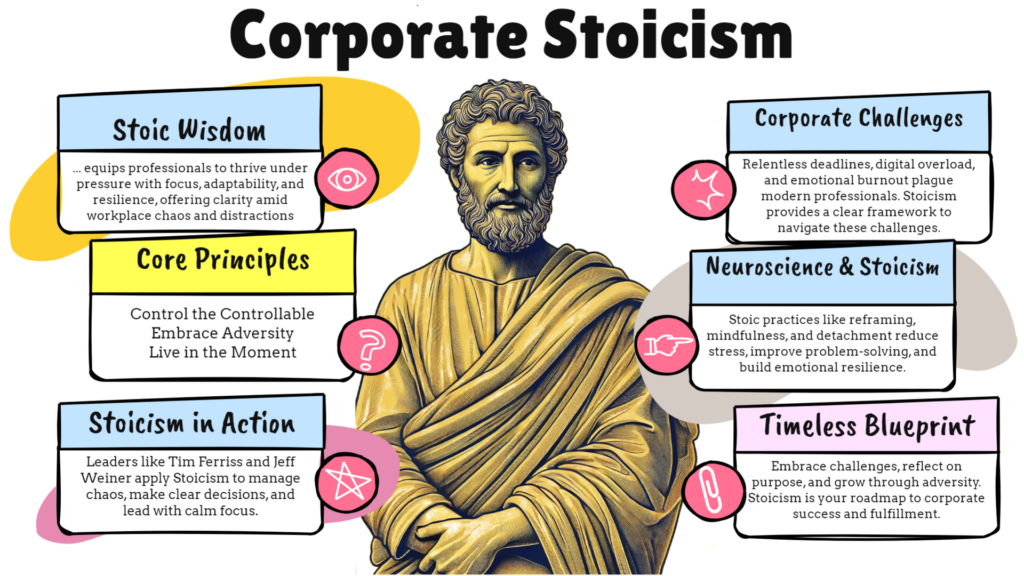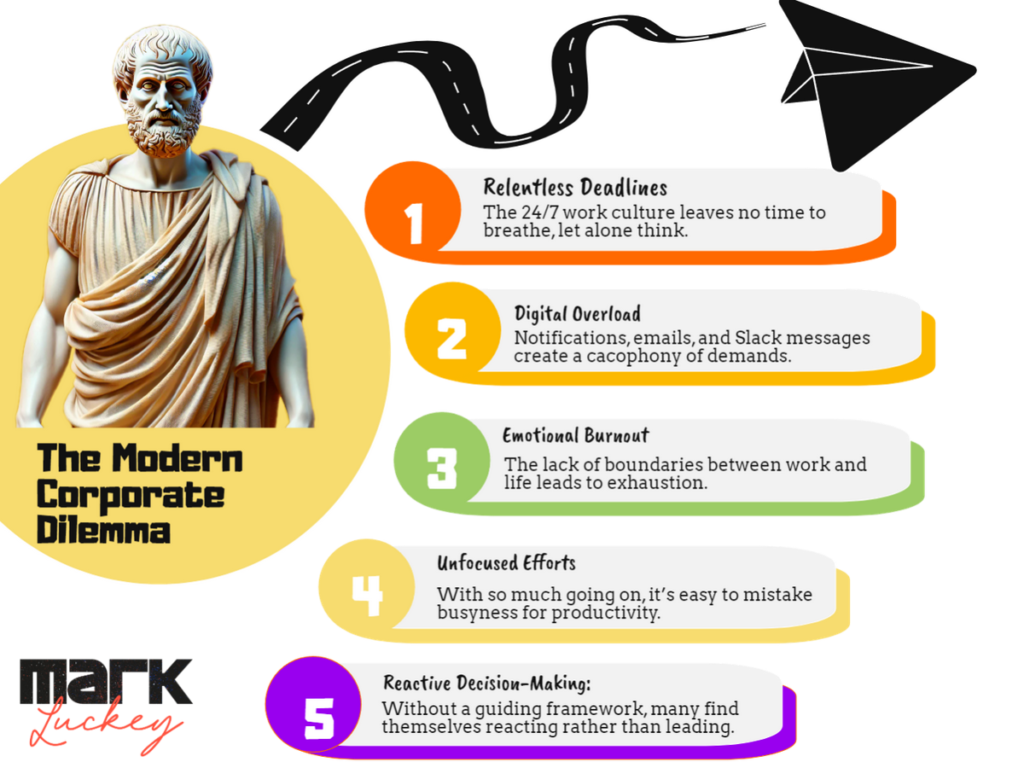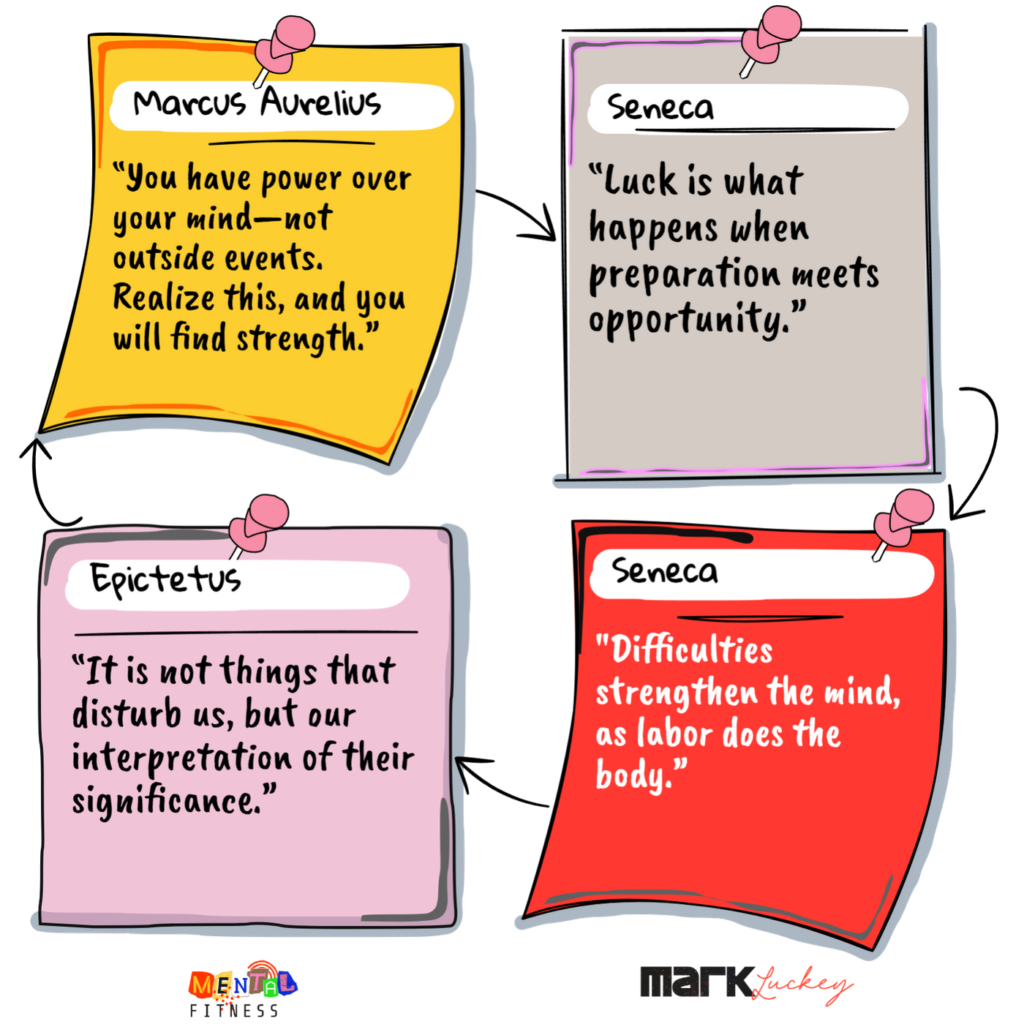

(…..somehow, the ancient Stoics have landed here as consultants. Yes, consultants—because clearly the company couldn’t afford AI. )
“Marcus Aurelius sits at his desk, typing his quarterly review like it’s a philosophical scroll, while Seneca and Epictetus argue whether using the last coffee pod without refilling counts as moral decay. It’s just another day at the office, where philosophy meets pettiness and no one’s sure why HR hired these guys.
A client cancels last-minute, sending the sales team into a frenzy. Chaos erupts: PowerPoint decks are flying, and Janet from
marketing is weeping into her oat milk latte. Marcus sits clicking his pen like a Buddhist monk who’s misplaced his meditation bell.
“You have power over your mind, not over your client’s flaky calendar,” Marcus declares, which is a bit rich coming from a guy who’s never had a Slack notification in his life. He suggests the team “use this time to refine their deck,” but the interns just mutter, “Alright, calm down, Aristotle-lite.”
You’re navigating a sea of deadlines, multitasking through meetings and battling digital distractions. Sound familiar? The corporate world is a pressure cooker .
Stoicism has found surprising relevance in today’s boardrooms and home offices. Stoicism was designed to help individuals master their inner world despite external turmoil. It’s the original “mind over matter” philosophy where resilience, focus, and adaptability are invaluable.
In a world where even Marcus Aurelius might’ve rolled his eyes at back-to-back Zoom meetings, Stoicism offers more than a coping mechanism—it’s a blueprint for thriving.
The Modern Corporate Dilemma

Modern professionals are in a perpetual state of catch-up, trying to balance ambition with well-being. This is where Stoicism comes in—not as a cure-all, but as a guiding light.
The HR Meltdown
Over in HR, Susan from payroll has accused Gary from IT of being “a loud breather.” Epictetus saunters past, clipboard in hand, looking like a guy who lives for these awkward dramas.
“It’s not what happens to you, but how you react to it,” he says smugly. Gary throws down his stress ball, muttering, “Easy for you to say, mate. You’re not stuck next to Darth Vader at the morning briefing.” Epictetus starts promoting his new “Stoic Resilience Workshop,” which everyone signs up for because it promises free muffins.
Meanwhile, in marketing, Seneca is rallying the troops to meet an impossible campaign deadline. He’s holding a Kanban board like it’s Moses’ tablet.
“Luck is what happens when preparation meets opportunity!” he shouts. “Also, when Janet stops crying.” To motivate the team, he breaks out his secret stash of 90% dark chocolate, declaring it “the snack of the virtuous.” The team reluctantly dives into work, partly inspired, mostly trapped.
Understanding Stoicism
Stoicism, founded by Zeno of Citium, is rooted in practical philosophy. It focuses on understanding what we can control (our thoughts and actions) and accepting what we cannot (external events). The core tenets include:
Virtue is the Highest Good: “Waste no more time arguing about what a good man should be. Be one.” — Marcus Aurelius
Live according to reason, courage, justice, and moderation. Aligns with the principles of ethical leadership, where reason and fairness guide decision-making. Leaders who embody courage and moderation foster trust and stability within their teams.
Focus on the Present: “True happiness is to enjoy the present, without anxious dependence upon the future.” — Seneca
Avoid being trapped by regrets of the past or anxieties about the future. Professionals can avoid the mental traps of regret over past mistakes or anxiety about future uncertainties, enabling them to stay productive and solution-oriented.
Embrace Adversity: “The impediment to action advances action. What stands in the way becomes the way.” — Marcus Aurelius
Turn missed targets, demanding clients, or economic downturns—into opportunities for growth and innovation. Stoic principles remind us that setbacks are not dead ends but stepping stones for advancing both personal and professional success.
Remote Work Mayhem
Marcus has had it with remote work. His inbox is a wasteland of “Sorry, my cat jumped on the keyboard” excuses. He fires off an email:
“Difficulties strengthen the mind as labor strengthens the body. Also, mute your microphones during Zoom calls. No one needs to hear your dog’s opinions on quarterly targets.”
He blocks out his afternoon for “Reflecting on the Logos,” which turns out to be Stoic for “taking a nap.”

Neuroscience Meets Stoicism
Modern neuroscience validates Stoic practices:
Cognitive Reappraisal: Reframing challenges, a Stoic staple, engages the prefrontal cortex, reducing stress and enhancing problem-solving abilities.
Stoic Quote: “It’s not what happens to you, but how you react to it that matters.” This aligns with studies showing that cognitive reappraisal changes the brain’s stress response, fostering emotional resilience.
Mindfulness Activation: Practices like daily reflection improve neuroplasticity, training the brain to respond calmly under pressure.
Stoic Quote: “Dwell on the beauty of life. Watch the stars, and see yourself running with them.” Such mindfulness trains the brain to find balance in the moment.
Stress Reduction: Stoic detachment lowers cortisol levels, fostering emotional stability and physical well-being.
These intersections between ancient wisdom and modern neuroscience reinforce the value of Stoic principles for thriving in demanding environments.
Stoicism in Action
Tim Ferriss (bestselling author and entrepreneur) uses daily affirmations, inspired by Stoic philosophy, to reframe challenges and focus on impactful decisions. In interviews, he highlights how reframing “setbacks” as experiments has fueled his growth, personally and professionally.
LinkedIn’s former CEO, Jeff Weiner, practices Stoic detachment to maintain clarity during high-stakes negotiations. By focusing on controllable elements and accepting uncontrollable outcomes, Weiner led LinkedIn through significant growth, balancing ambition with a calm and composed leadership style.
Break Room Philosophy
As the day winds down, the Stoics gather in the break room for tea and reflection. Seneca beams at their accomplishments, while Epictetus congratulates himself on not engaging in a Slack flame war.
“Tomorrow will bring new obstacles,” Marcus intones, sipping his chamomile tea. “But remember, we are not disturbed by external events, but by our judgment of them. Also, someone restock the chamomile, or I will disturb you all.”
In a world teeming with distractions and pressures, Stoicism offers more than resilience—it’s a roadmap for thriving. By focusing on what we can control, reframing adversity, and cultivating mindfulness, we not only meet challenges head-on but use them to grow.
Start today: Mute the distractions, reflect on your purpose, and let Marcus Aurelius guide you to corporate success. The wisdom of Stoicism is timeless, and its power is yours to harness.